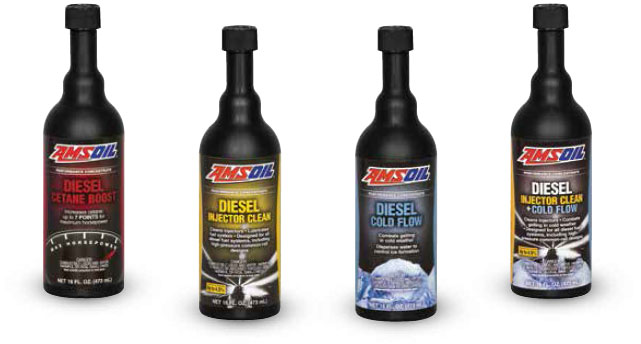
AMSOIL Diesel Cold Flow (ACF) combats diesel fuel gelling by improving diesel cold-flow ability. It is formulated with an advanced deicer to enhance fuel flow and help prevent fuel filter plugging in cold temperatures. Diesel Cold Flow is formulated for a broad range of diesel fuels, including biodiesel and #1 and #2 ultra-low-sulfur diesel (ULSD). Unlike all-in-one fuel additives that may sacrifice performance in specific areas in the name of convenience, AMSOIL Diesel Cold Flow makes no sacrifices; it is purpose-built for diesel owners who demand maximum results.
Treat Rate:
Just two ounces for every five gallons of fuel!
Reduces Need for #1 Diesel Fuel
Using #1 diesel fuel is one traditional solution to cold-weather diesel fuel problems. While #1 diesel fuel has an advantage in low-temperature operability, the energy content of #1 diesel fuel is about 95 percent that of #2 diesel fuel, resulting in reduced fuel economy and less horsepower. In addition, the kerosene used in #1 diesel fuel provides less lubrication for the fuel pump and fuel injectors, increasing the likelihood for wear. AMSOIL Diesel Cold Flow minimizes the need for blending standard #2 diesel fuel with lower-quality #1 diesel fuel, helping to maintain fuel economy and keep engines functioning normally.
Helps Prevent Gelling
As the temperature drops, the wax naturally found in diesel fuel begins to crystallize. The point at which wax crystals form is known as the cloud point. These wax crystals eventually clog the fuel filter and starve the engine of fuel, preventing it from starting. While low-quality fuels may form wax crystals in temperatures as warm as 40ºF (4ºC), most fuels have a cloud point near 32ºF (0ºC). The point at which the crystals clog the fuel filter is known as the cold filter-plugging point (CFPP). AMSOIL Diesel Cold Flow lowers the CFPP by up to 20ºF (15ºC) in ULSD.
Additional Benefits of Diesel Cold Flow
AMSOIL Diesel Cold Flow uses a jet-fuel-type deicer that disperses water to control ice formation throughout the fuel system. It inhibits wax crystal formation and can improve diesel pour point as much as 58ºF (32ºC), allowing fuel to flow to the engine more easily and improving diesel engine reliability in cold temperatures.
AMSOIL’s Cold Flow improver is also available available in a combination bottle of our award winning Diesel Injector Clean fuel additive so if you are not treating your diesel fuel with a lubricant and cleaner this one will keep you covered. Please read more about our top selling diesel fuel cleaner fuel additive (AMSOIL ADF) maintenance product which you MUST use to keep your injectors clean and free from severe and costly wear.
If refiners make changes to diesel fuel in winter months, why do cold flow improvers need to be used?
During cold weather months, fuel refiners produce a #1 diesel fuel that flows more readily in colder temperatures. Some refiners also produce a product termed a winter blend which is a blend of #2, #1 and potentially cold flow improver additives. Fuel varies significantly in different regions, and refiners estimate how low the temperature will actually drop in these regions. Depending on the fuel source and temperature mix, fuel directly from gas stations may cause issues with wax formation, preventing vehicles from starting and stalling while on the road.
From Wikipedia
Using these guidelines gas stations offer “winter ready diesel” for sale to the Motorist – there are two ways to achieve this:
- winter blend – the gas station has blended the No.2 diesel with No.1(kerosene) by some percentage.
- winterized diesel – the No.2 diesel has been treated with additives by the diesel supplier.
As the treatment with additives (1:40000[35]) is a cheaper way to enhance No.2 fuel in winter, most stations offer winterized diesel in cold weather conditions. In regions with colder weather, most gas stations offer No.1 fuel at the same pump allowing drivers to decide for themselves on a winter blend.
Always inquire at your local diesel fuel stop the version or their knowledge of the state of Winter diesel or blended fuel at their locality. The AMSOIL product will enhance that limit another 20 degrees.
